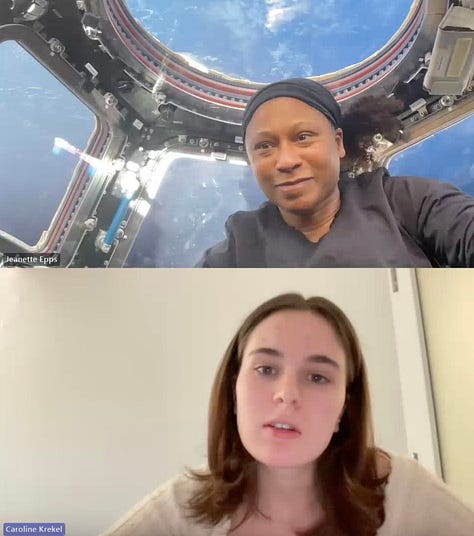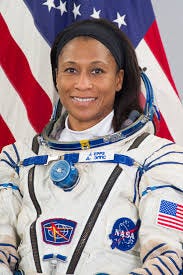Houston We Have a (gender equity) Problem!
Dr. Jeanette Epps Live from the International Space Station
I consider myself to be a big fan of gravity. Not in the sense that I enjoy overly serious things, but that I like when my feet are firmly planted on the ground. On earth specifically. Which is why I am so intrigued by the story of Dr. Jeanette Epps, a mission specialist currently aboard the International Space Station and the only female member of SpaceX crew 8.
What sparked your interest in pursuing a career in STEM?
Epps: [My twin sister Janet and I] only watched public television and they always had things about STEM. Nova was a big one, I think Cosmos came on at the time as well. So we got really interested because we were watching a lot of public television. Then my older brother said to Janet and me “well, you know, you guys can become aerospace engineers or even an astronaut”. So, at nine years old, I got this bit stuck in my brain that I was going to be an aerospace engineer. There is a study that talks about little girls that are around the age of nine. They lose interest. Janet and I did not lose interest because I think we had so many people who were giving us the confidence to continue in math and science. We did have people who tried to bully us but we had too many older brothers and sisters for everyone to pick on us. My entire family and even teachers and classmates were really supportive of everything that Janet and I were doing, so we never thought that it was unusual or [that] we were just being too nerdy.
What has your experience been like working in a male dominated industry?
Epps: I think you know, now that I look back over my career, a lot of people had issues with me being there. But I let it be their problem. I made sure I did my work and I progressed forward from there. Early on in my career, even as an undergrad, I let things bother me. And I noticed that it did hinder me because I was too concerned about what other people were thinking. And then once I got rid of that though I swear everything kind of just trended upward. That's truly how I ended up continuing and staying even when things got bleak.
According to NASA, there's been a total of 360 astronaut candidates chosen since its inception. Of those, only 61 have been women. Why do you think that there's such a large gap?
Epps: That stat is horrible. It's a horrible stat because it's true. One of the studies that they did at the start of the space race, they [tested] a group of women and [found that] women were likely better for long duration missions because they could handle the isolation better. So there was a conscious change of mind that they were not gonna select women back then. I think it was just culture and tradition at the time, to be honest. And that, you know, things are still changing, but it's hard to change a culture in a generation. Sometimes it takes a little bit longer than a generation to change a mindset like that. But I know that there's a lot of women who want to go to space. So we are trying to get the numbers to change and they will.
Do you think that social media has been helpful in promoting STEM careers to girls?
Epps: I think so. The only issue is that you gotta know what to look for, because it's not just put [in front of] your face. I definitely think that social media has been very helpful in promoting and building organizations that can help girls. I've had young ladies just direct message me. Or just direct message someone else to get a group of women together and have a conversation. So it's helpful that way you can reach people easier than in the past.
What's next after your return to Earth?
Epps: We have a bunch of debriefs about how things went here on orbit. Then [we’ll] have a bunch of PR. We get to actually go out and tell people what we did up here. I want to go overseas and talk to girls, especially in [places] like Qatar and Turkey and Hungary and just talk to women. Everything is infinitely doable and possible. So just, you know, these girls need to know that.
Epps’ story proves that what young girls are told about math and science matters. The extent to which children are supported in the exploration of their interests can determine whether or not an interest blossoms into a career later on. Through her work, Epps aims to challenge the narrative that women are too often told about pursuing STEM careers, with the hope that someday soon, success in the STEM field will become the norm for girls everywhere. Epps is no doubt an inspiration to girls and women who dream of zero gravity.







What an inspiring post! The accomplishments of Dr. Jeanette Epps, being the only female member of SpaceX crew-8 on the International Space Station, are truly extraordinary! Her story symbolizes both her individual dedication and resilience while also highlighting ongoing gender imbalances in STEM. This imbalance in male-dominated sectors can also be applied to motorsports, particularly Formula 1, where talented women remain vastly underrepresented. However, Dr. Epps’s account offers a compelling illustration of how consistent challenges to stereotypes and efforts toward inclusivity can create a more equitable future for women across all fields.
I had no idea you could zoom from space! This was a great read, it's so important to share inspiring stories like Dr. Epps'. My coworker is always looking for female role models for her presentation to feminine-oriented high school students, so I will definitely mention Dr. Epps to her!